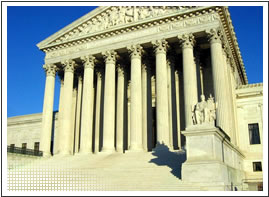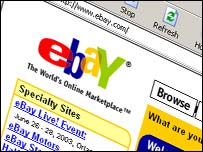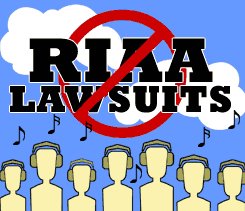Coming to a Supreme Court Near You!!!: Ebay v. MercExchange

The long standing patent issue over eBay's "Buy It Now" functionality is now headed for the supreme court. The issue is not only whether Ebay has infringed on two patents owned by MercExchange, a now defunct travel auction site, but whether the Federal Court's decision to grant an injunction against the internet giant was correct. A district court found eBay guilty of infringing, but when weighed against the four prong test used by the Court of Appeals Federal Circuit (CAFC), found that no irreparable damage would be caused and thus denied the injunction. A Federal Court later granted the injunction, awarding damages of 29.5 million dollars. If the injunction is validated, than eBay will either have to stop using the "Buy It Now" feature of their site or settle a licensing agreement with MercExchange. If the Supreme Court sides with eBay, they will still have to pay damages, but will not be obligated to cease using the "Buy It Now" feature.
What are the facts of the case? Hard to tell exactly. A sympathetic interview with Thomas Woolston, the CEO of MercExchange who formerly worked with the C.I.A. as an electric engineer, goes through Woolston's chronology of the events with eBay, turning from a friendly lunch with Ebay representatives to disbelief as Woolston watches his patents stolen by a much larger rival company. Conversely, a Washington Post article quotes Jay Thomas, a Georgetown U. law professor who notes with respect to Woolston's patent battle, "Some people call this 'trolling' after the old story where trolls sit under the bridge and say, 'Give me a gold coin or I'll eat you' ", suggesting a less than noble intent on the part of MercExchange.
What are the issues? The most helpful info I found came from the Patent Law Blog Patently-O which has analysis on the current status of the case, eBay's writ of cetoria, and the appeals court decision. From the Nov. 29, 2005 post, Dennis Crouch writes,
So big news for patent law, and internet law as well.The issues before the Court include:
...According to regarded patent law professor Joseph Miller, this certiorari decision is breathtaking. ÂIf the Court writes narrowly, it will be the most important patent case since Chakrabarty or Diehr. If the Court writes broadly, it will be the most important patent case (perhaps even the most important patent or copyright case) in a century.
- Whether the Federal Circuit erred in setting forth a general rule in patent cases that a district court must, absent exceptional circumstances, issue a permanent injunction after a finding of infringement. (Question proposed by eBay).
- Whether this Court should reconsider its precedents, including Continental Paper Bag Co. v. Eastern Paper Bag Co., 210 U.S. 405 (1908), on when it is appropriate to grant an injunction against a patent infringer. (Question proposed by Supreme Court).
Given that no one reads this, it is unnecessary to make a disclaimer- but what the hell. The rest of this post deals with the wording of the briefs filed by Ebay, MercExchange, and the EFF. Yea, it's that exciting (links to the briefs by eBay, MercExchange, and EFF).
1) Public Interest: This is the showstopper. At issue is legal precedent, stemming largely from Continental Paper Bag Co. v.
 Eastern Paper Bag Co., a similar decision in which a company not using patented material sued another company for patent infringement. In the case an injunction was granted. Now the Supreme Court has agreed to re-evaluate the case.
Eastern Paper Bag Co., a similar decision in which a company not using patented material sued another company for patent infringement. In the case an injunction was granted. Now the Supreme Court has agreed to re-evaluate the case.MercExchange argues that injunctions are necessary to protect the right of property as enshrined in patent law legislation, and quotes legal precedent to this effect, noting that traditionally exceptions are given to injunctions only where there is a clear public interest involved, for example if use of patented material is tied to public health.
eBay both denies this interpretation of legal precedence, and offers supplemental public interest arguments. It notes that
"The court of appeals held that "[b]ecause the 'right to exclude recognized in a patent is but the essence of the concept of property,' the general rule is that a permanent injunction will issue once infringement and validity have been adjudged... the court may decline to enter an injunction when 'a patentee's failure to practice the planned invention frustrates an important public need for the invention,' such as the need to use an invention to protect public health." (10-12)eBay argues that this decision "jettisoned the familiar principles of equity in favor of a "general rule" that requires the issuance of a permanent injunction as a matter of course, absent aexceptionalal circumstance" (14). This 'shifts' the burden of patent protection away from the patent holder, stifling innovation, and downplays the use of other, more reasonable alternatives to settling patent disputes....
2) Channeling the Spirit of Patent Law Past: These differences are based in values that stem from conflictininterpretationsns of how injunctions play a part in patent law. MercExchange views injunctions as the only true source of protecting exclusionary patent ownership (and therefore the right of property), quoting from Kewanee Oil Co. v. Bicron Corp that "The patent laws promote [the Progress of Science and useful Arts] by offering a right of exclusion for a limited period as an incentive to inventors to risk the often enormous costs in terms of time, research, and development" (2). The importance of exclusion, the argument goes, necessitates the action of injunction. Monetary damages can simply NOT protect the patent in the same manner. When the district court made its decision, it used MercExchange's previous licensing agreement with GoTo.com (now owned by Yahoo) to conclude that since the patent was already being licensed, monetary damages would be sufficient. The Federal Circuit Court argues that just because patented material is licensed out, that does not erode any of the protection that is offered by law.
The Electronic Frontier Foundation, echoing the concerns of eBay, voices a scathing attack on the Circuit decision by displaying why such a precedent would in fact endanger the very point of patent law:
"What is worse, the Federal Circuit automatic injunction rule effectively shifts the burdens of the parties. Normally, trequestertor (often the patentee in cases such as this one) bears the full burden of proving that prohibitive relief is required. This includes affirmatively proving that the balance of hardships weighs in its favor and that the public interest will not be unduly harmed by the imposition of the injunction. The Federal CircuitÂs new standard, by contrast, effectively requires the defendant to prove the contraryÂi.e., that Âextraordinary circumstances justify denial of the injunction request." (7)It's interesting to note the language of the parties involved: Although all 3 share much of the same wording, MercExchange is heavy with concerns about "rights", eBay with pragmatic (economic) concerns, and EFF with values.
3) Channeling the Spirits of Patent Law Present and Future: eBay and the EFF make further arguments that supplement their argument against the Federal Circuit decision.
First, eBay argues that the negative effects of a philosophy like the Federal Circuit's towards patent law is already taking place, noting that "Between 1994 and 2004, the district courts have seen a fully 90 percent increase in the number of filed patent cases... the Federal Circuit has imposed substantial and unwarranted costs on innovating companies" (3). This creates "entities such as MercExchange [that] exist for no other purpose but to threaten infringement suits in hops of securing a profitable license through litigation or settlement" (4). This is the sort of 'trolling' that Prof. Thomas was talking about: MercExchange waits for other companies to infringe on its patent, while not doing anything to innovate, use, or improve the product.
The EFF brief includes a really interesting analysis of why the nature of the internet changes the meaning and effect of patent law. They argue that if the Federal Circuit decision is upheld, such patent law abuses will become widespread with respect to communications technologies used on the net. Soon, everything from e-mail to video and music transfer software that is freely available will become under attack:
In particular, the Federal Circuit offers little, if any, room for consideration of an increasingly evident public interest in patent litigationÂfree speech. Freedom of expression is not an absolute. It can be and has been constrained by the rule of law, including the rules permitting injunctive relief. Yet in order to do so, courts of equity must be free to weigh the need for injunctive relief against the potential impact such relief may have on speech and speech-related activities. This Court's jurisprudence demands nothing less. The Federal CircuitÂs automatic injunction rule completely ignores this balance..Patent owners who claim control over Internet publishing mechanisms are in a position to threaten anyone who uses them, even for personal non-commercial purposes. (8)I doubt that such issues will be directly taken up by the court, but freedom of expression issues may find their way into dissenting or concurring opinions. If nothing else, it may create legal precedent for when the next big freedom of expression case comes a'knockin'. My prediction is that the Supreme Court will overrule the Federal Circuit's decision as well as Paper Bag based on analysis that injunctions should not be traditionally granted for cases with similar circumstances.





